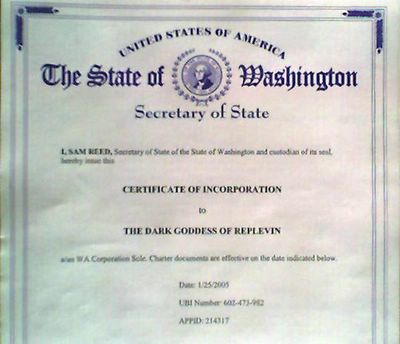 I believe I understand what the school is getting at here, but I'd like to see schoolteachers speak more clearly than this.
I believe I understand what the school is getting at here, but I'd like to see schoolteachers speak more clearly than this.
2.25.2009
what ARE they teaching them in school?
 I believe I understand what the school is getting at here, but I'd like to see schoolteachers speak more clearly than this.
I believe I understand what the school is getting at here, but I'd like to see schoolteachers speak more clearly than this.
2.02.2009
col. mustard, in the pantry, with a lead pipe
I actually am beginning to think that it would be interesting to be a network administrator.
Nothing in my training or experience to date has given me the tools to solve this conundrum:
Our server has Windows Server 2003, which is (of course) not quite the same thing as Windows Small Business Server 2003. SBS 2003 has Windows Server 2003 as one component, but it also has added stuff (if you trust the word of Wikipedia). SBS 2003 is not automatically compatible with Windows Vista on the client OSes (speaking of clients in the network sense and not the legal sense here). There is little material available on Server 2003 compatibility with Vista, but by inference it might need the same patch. But I'm not sure.
Our server also has SQL Server 2000, which is apparently also not compatible with Windows Vista for client OSes (if you trust the word of Microsoft).
Our network includes at least four Windows Vista machines, one of which is Home Premium and not Business, a bunch of XP machines, and a Mac running Windows on a VM. I sincerely hope no one is still using Windows 98, but I wouldn't be too surprised.
If we upgrade SQL Server too much, I'm concerned it will not be compatible with Windows Server (is anyone still following me?).
And what's going to happen when people start upgrading to Windows 7?
Maybe I should just quietly switch the server over to Ubuntu.
May I please go back to practicing law now?
Nothing in my training or experience to date has given me the tools to solve this conundrum:
Our server has Windows Server 2003, which is (of course) not quite the same thing as Windows Small Business Server 2003. SBS 2003 has Windows Server 2003 as one component, but it also has added stuff (if you trust the word of Wikipedia). SBS 2003 is not automatically compatible with Windows Vista on the client OSes (speaking of clients in the network sense and not the legal sense here). There is little material available on Server 2003 compatibility with Vista, but by inference it might need the same patch. But I'm not sure.
Our server also has SQL Server 2000, which is apparently also not compatible with Windows Vista for client OSes (if you trust the word of Microsoft).
Our network includes at least four Windows Vista machines, one of which is Home Premium and not Business, a bunch of XP machines, and a Mac running Windows on a VM. I sincerely hope no one is still using Windows 98, but I wouldn't be too surprised.
If we upgrade SQL Server too much, I'm concerned it will not be compatible with Windows Server (is anyone still following me?).
And what's going to happen when people start upgrading to Windows 7?
Maybe I should just quietly switch the server over to Ubuntu.
May I please go back to practicing law now?
Subscribe to:
Comments (Atom)
